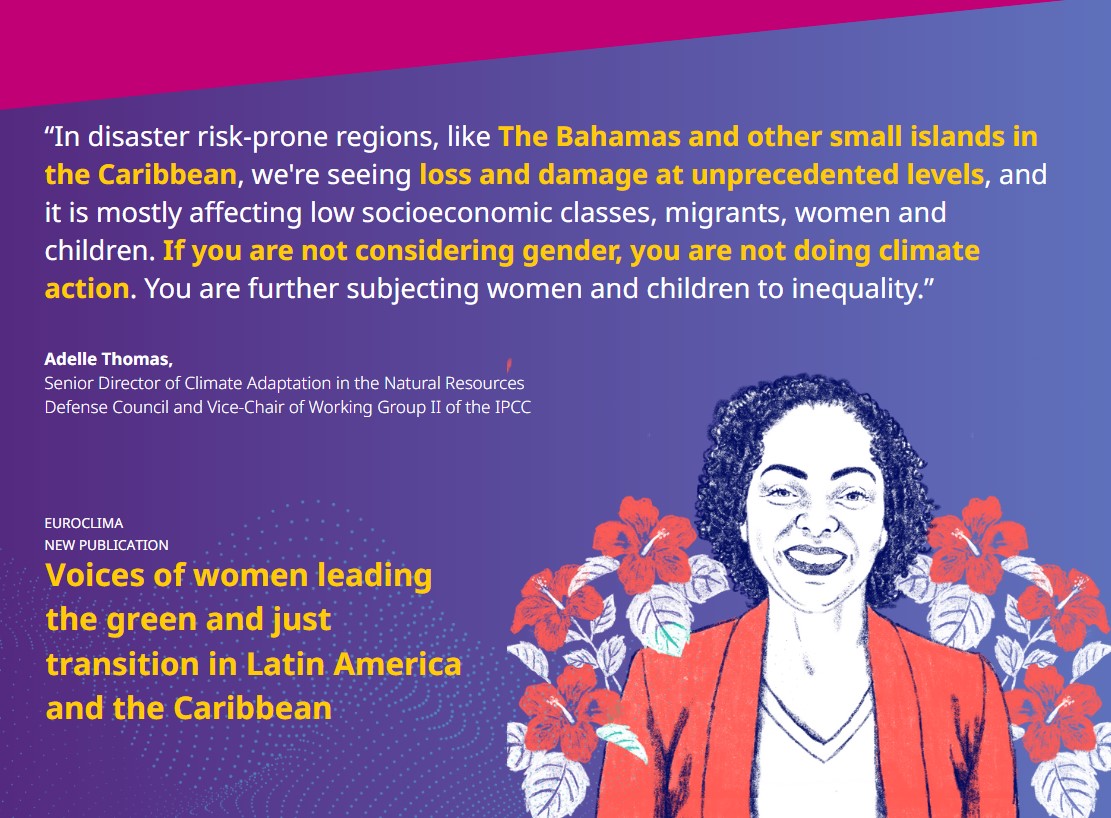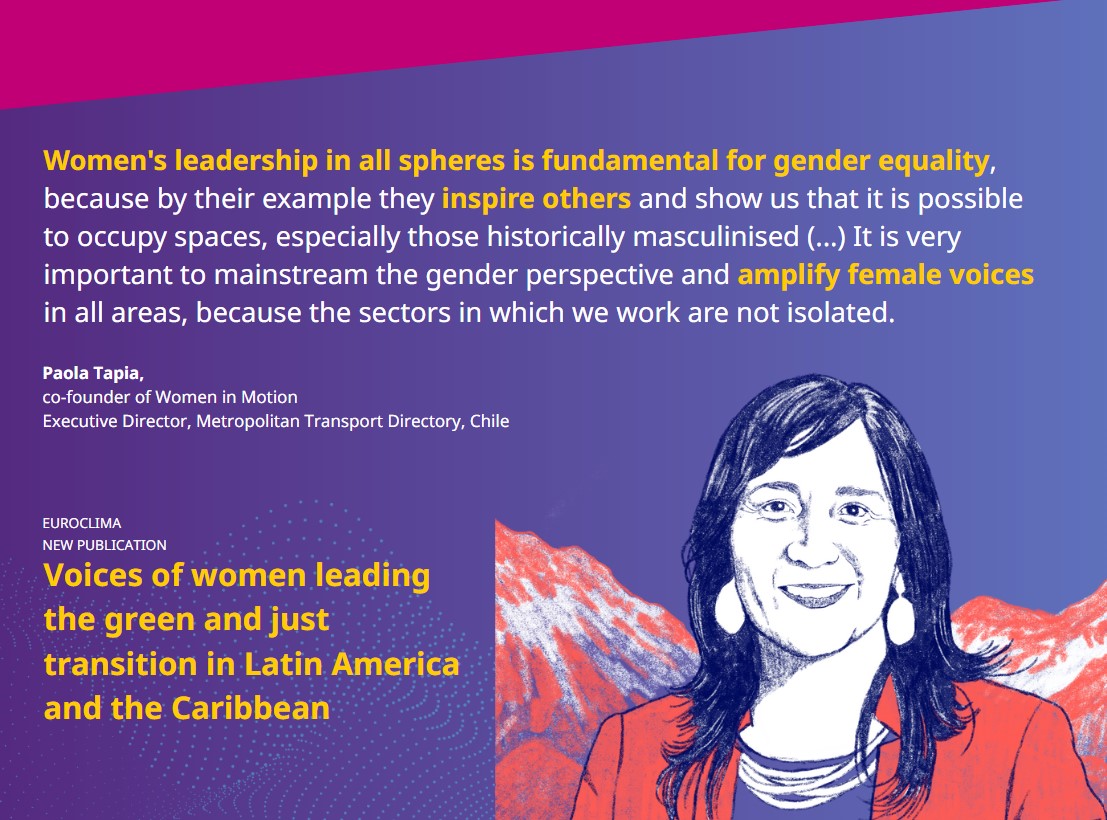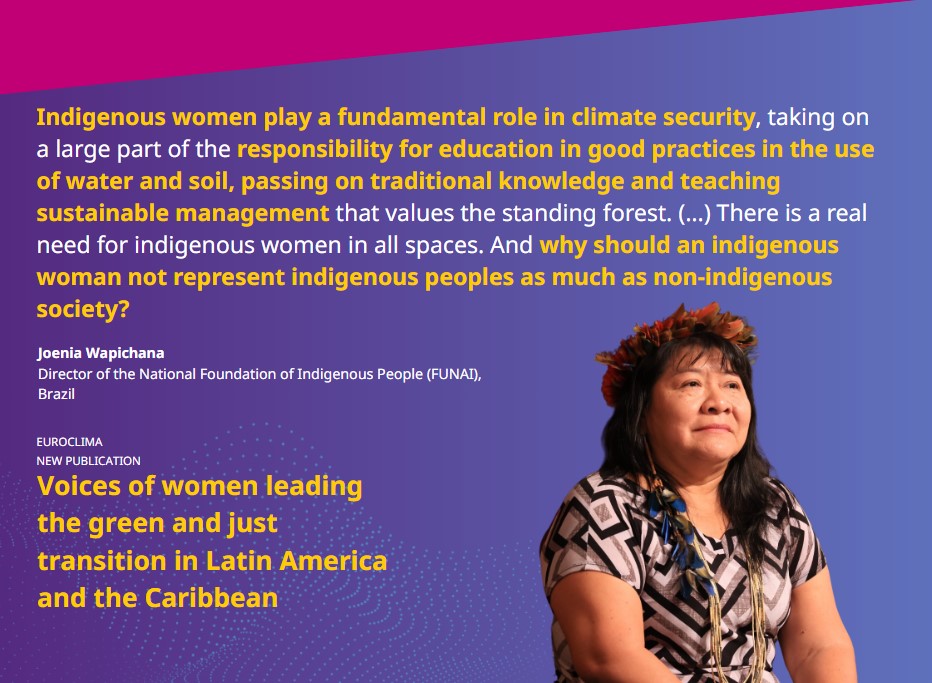Voices of women leading the green and just transition in Latin America and the Caribbean
News details
The devastating effects of climate change and biodiversity loss are already impacting people’s lives and livelihoods, deepening inequalities, and putting vulnerable communities at extreme risk. Latin America and the Caribbean, a region rich in biodiversity yet disproportionately affected by environmental degradation, is experiencing these challenges firsthand. In this context, women are not only among the most affected by climate change but also at the forefront of transformative action. They are leading green and just transitions, safeguarding ecosystems, strengthening the social fabric that binds communities together, and advancing inclusive economic opportunities.

Recognizing women as agents of change is essential to unlocking the full potential of their leadership in the fight for climate justice and sustainable development. Their voices must be heard, and their contributions must be acknowledged at every level of decision-making. Despite progress, women’s voices remain underrepresented in climate policy and sustainability discussions, undermining effective climate solutions and hindering a truly just and green transition. To address the climate crisis and build a sustainable future, women must not only be included but also empowered and recognized as leaders, with their contributions shaping policies, programs, and initiatives while taking up essential spaces in decision-making processes.

In this context, the publication “Voices of Women Leading the Green and Just Transition in Latin America and the Caribbean” offers an overview of regional climate action, highlighting both the strengths and challenges in the pursuit of an equitable environmental future. It amplifies the voices of 25 women leaders from different countries across the region, each contributing their unique perspectives from various levels and sectors shaping the green and just transition. Their insights encompass key areas such as urban mobility, sustainable energy, circular economy, water and sanitation, biodiversity conservation, resilient food production, disaster risk reduction, governance, and climate finance.
Key Insights and Recommendations
The publication “Voices of Women Leading the Green and Just Transition in Latin America and the Caribbean” showcases the insights of 25 remarkable women leaders at the forefront of climate and environmental action across diverse sectors and regions in Latin America and the Caribbean. Their reflections are organized around three central themes, that they identified as most critical and had guided their contributions into three primary axes:
- Gender and Climate Change: This axis focuses on the urgent need to integrate gender into climate policies and environmental justice. As leaders emphasize, the climate crisis disproportionately impacts women, and therefore, women's voices must be included in decision-making to create effective solutions. Their call for an intersectional approach to climate policy speaks to the multiple layers of inequality that must be addressed in climate action.
“Many people have had to leave their territories and go to the city because of climatic disasters. They have been forced to reinvent themselves in search of opportunities that are not available. An important consequence is that the social fabric in which they were embedded is being destroyed. The environmental crisis and the gender crisis are, in reality, a single problem that refers to the way in which we conceive and inhabit territories.”
Carolina Cuesta - Co-Founder of the Youth Network for Disaster Risk Reduction in the Americas and the Caribbean
- Poverty and Rights: Leaders highlight the inseparable connection between poverty, exclusion, and climate vulnerability, advocating for empowering marginalized groups by promoting autonomy and access to essential services while respecting diverse cultures. Their voices champion the idea that addressing these issues is essential for achieving climate justice and ensuring the sustainability of affected communities.
“We have to deal with the environment, but we also have to deal with inequalities. We have to go to the territories, understand how the problems are manifested and understood in each context, in order to give meaning to the policy before implementing it. Otherwise, we will continue to generate rights that we will not be able to materialize later.”
Margarita Velázquez - Researcher at the Regional Center for Multidisciplinary Research at the National Autonomous University of Mexico
- Leadership, Empowerment, and Political Participation: This axis emphasizes the need for women's leadership and empowerment in the political and social realms. Leaders stress the importance of investing in women’s education and leadership to effectively address complex climate challenges. While also advocating for building strong networks of women leaders in the green transition to ensure a collaborative, sustainable approach to tackling climate change.
“When there is equal participation of women, the policies are very different. You have the capacity to complement and integrate visions that result in policies that contribute in different ways. You can see the difference in the recognition of women's intervention from a political and technical point of view, because they influence not only the design of
projects, but also the process.” Sandra Guzmán, Founder and general director of the Climate Finance Group for Latin America and the Caribbean
Finally, the publication offers policy recommendations for promoting gender-responsive approaches to climate action and biodiversity conservation. To effectively tackle the challenges at hand, the region must adopt integrated solutions that address both environmental and social dimensions. A gender-responsive approach should be embedded in climate policies from the planning stages, ensuring that the needs and rights of all populations are considered. It is essential to emphasize the importance of context-specific, localized frameworks, and to ensure equal and meaningful participation of marginalized groups, particularly women, in climate policy design and implementation. This requires tailored engagement strategies and ongoing feedback mechanisms to create truly inclusive policies, which Gabriela Gavarrete, Founder of the project Suma Un Bosque also highlights:
“It is important to consult and exchange with communities, as well as to systematise the results of these contacts and return this knowledge to the communities themselves, so that the actions that are implemented are relevant and really useful today and in the future."
Another key recommendation is the collection of gender-disaggregated data to inform evidence-based, equitable policies that address the unique challenges faced by women and marginalized groups. Additionally, supporting women's leadership through structural reforms and cultural shifts is essential to ensure their representation in decision-making spaces. This includes providing equal access to education, training, and green job opportunities. Equally important is prioritizing the leadership and knowledge of Indigenous peoples, especially Indigenous women, whose traditional practices are crucial for tackling the climate and biodiversity crises. Policies must protect their rights, promote their active involvement in decision-making, and respect their knowledge systems. As Joenia Wapichana, Director of the National Foundation of Indigenous People (FUNAI), powerfully states:

This publication amplifies the voices of 25 remarkable women leading the green and just transition in Latin America and the Caribbean, highlighting their pivotal role in addressing climate and environmental challenges while contributing to ongoing dialogues in various spaces. We encourage readers to engage with their testimonies first-hand, drawing inspiration from the dedication and resilience these women demonstrate in driving a transition that is not only green but also fair and inclusive. Their actions reveal the importance of considering diverse factors, essential for implementing sustainable and effective solutions, and show that diversity in participation and decision-making is key to tackling the climate and environmental crisis equitably. The recommendations presented in this publication, shaped by these conversations, provide a clear roadmap for advancing gender-responsive climate action in the region. They emphasize the need for inclusive, intersectional, and rights-based approaches to both climate and biodiversity. By ensuring women's active participation, dismantling systemic barriers, and fostering an environment that supports their leadership, we can move toward a green and just future.

Log in with your EU Login account to post or comment on the platform.